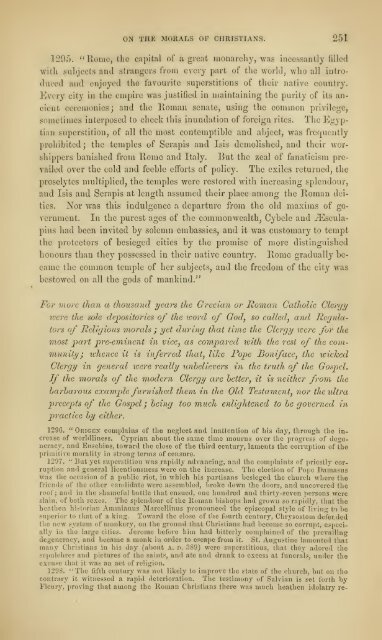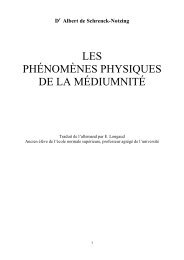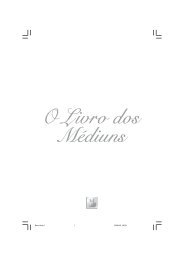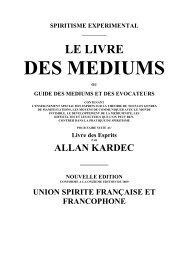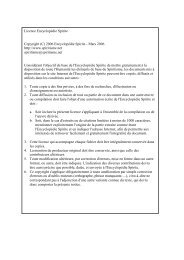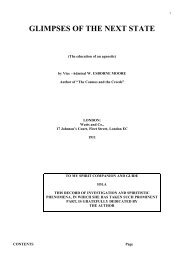Experimental investigation of the spirit manifestations, [electronic ...
Experimental investigation of the spirit manifestations, [electronic ...
Experimental investigation of the spirit manifestations, [electronic ...
- No tags were found...
Create successful ePaper yourself
Turn your PDF publications into a flip-book with our unique Google optimized e-Paper software.
ON TIIK MORALS OF CHRISTIANS. 2511205. ^niomc, <strong>the</strong> capital <strong>of</strong> a great nionarcliy, was incessantly filledwith .subjects and strangers from every part <strong>of</strong> <strong>the</strong> world, who all introducedand enjoyed <strong>the</strong> favourite superstitions <strong>of</strong> <strong>the</strong>ir native country.Every city in <strong>the</strong> empire was justified in maintaining <strong>the</strong> purity <strong>of</strong> its ancientceremonies; and <strong>the</strong> Koman senate, using <strong>the</strong> common privilege,sometimes interposed to check this inundation <strong>of</strong> foreign rites. The 3'^gyptiansuperstition, <strong>of</strong> all <strong>the</strong> most contemptible and al^jcct, was frequentlyprohibited; <strong>the</strong> temples <strong>of</strong> Serapis and Isis demolished, and <strong>the</strong>ir worshippersbanished from Rome and Italy. But <strong>the</strong> zeal <strong>of</strong> fanaticism prevailedover <strong>the</strong> cold and feeble efforts <strong>of</strong> policy. The exiles returned, <strong>the</strong>proselytes multiplied, <strong>the</strong> temples were restored with increasing splendour,and Isis and Serapis at length assumed <strong>the</strong>ir place among <strong>the</strong> Roman deities.Nor was this indulgence a departure from <strong>the</strong> old maxims <strong>of</strong> government.In <strong>the</strong> purest ages <strong>of</strong> <strong>the</strong> commonwealth, Cybele and ^sculapiushad been invited by solemn embassies, and it was customary to tempt<strong>the</strong> protectors <strong>of</strong> besieged cities by <strong>the</strong> promise <strong>of</strong> more distinguishedhonours than <strong>the</strong>y possessed in <strong>the</strong>ir native country.Rome gradually became<strong>the</strong> common temple <strong>of</strong> her subjects, and <strong>the</strong> freedom <strong>of</strong> <strong>the</strong> city wasbestowed on all <strong>the</strong> gods <strong>of</strong> mankind."For more than a thousand years <strong>the</strong> Grecian or Roman Catholic Clergyloere <strong>the</strong> sole depositories <strong>of</strong> <strong>the</strong> word <strong>of</strong> Gody so called, and Regulators<strong>of</strong> Religious morals } yet during that time <strong>the</strong>Clergy luere for <strong>the</strong>most 2^cirt pre-eminent in vice, as compared tcith <strong>the</strong> rest <strong>of</strong> <strong>the</strong> community;tvhence it ts inferred that, like Pope Boniface, <strong>the</strong> wichedClergy in general luere really unbelievers in <strong>the</strong> truth <strong>of</strong> <strong>the</strong> Gospel.If <strong>the</strong> morals <strong>of</strong> <strong>the</strong> modern Clergy are better, it is nei<strong>the</strong>r from <strong>the</strong>barbarous example furnished <strong>the</strong>m in <strong>the</strong>Old Testament, nor <strong>the</strong> ultraprecepts <strong>of</strong> <strong>the</strong> Gospel ; being too much enlightened to be governed inpractice by ei<strong>the</strong>r.1296. " Origen complains <strong>of</strong> <strong>the</strong> neglect and inattention <strong>of</strong> his day, tlirougli <strong>the</strong> increase<strong>of</strong> worldliness. Cyprian about <strong>the</strong> same time mom-us over <strong>the</strong> pi'ogress <strong>of</strong> degeneracy,and Euscbius, toward <strong>the</strong> close <strong>of</strong> <strong>the</strong> third century, laments <strong>the</strong> corruption <strong>of</strong> <strong>the</strong>primitive morality in strong terms <strong>of</strong> censure.1297. "But j-et superstition was rapidly advancing, and <strong>the</strong> complaints <strong>of</strong> priestly corruptionand general licentiousness were on <strong>the</strong> increase. The election <strong>of</strong> Pope Damasuswas <strong>the</strong> occasion <strong>of</strong> a i)ublic riot, in which his partisans besieged <strong>the</strong> church where <strong>the</strong>friends <strong>of</strong> <strong>the</strong> o<strong>the</strong>r candidate were assembled, broke down <strong>the</strong> doors, and uncovered <strong>the</strong>ro<strong>of</strong> Jand in <strong>the</strong> shameful battle that ensued, one hundred and thirty-seven persons wereslain, <strong>of</strong> both sexes. The splendour <strong>of</strong> <strong>the</strong> Iloman bishops had grown so rapidly, that <strong>the</strong>hea<strong>the</strong>n historian Ammianus Marcellinus pronounced <strong>the</strong> episcopal style <strong>of</strong> living t'( besuperior to that <strong>of</strong> a king. Toward <strong>the</strong> close <strong>of</strong> <strong>the</strong> fourth century, Chrysostom defended<strong>the</strong> new system <strong>of</strong> monkery, on <strong>the</strong> ground that Christians had become so corrupt, especiallyin <strong>the</strong> large cities. Jerome before him had bitterly complained <strong>of</strong> <strong>the</strong> prevailinodegeneracy,and became a monk in order to escape from it. St. Augustine lamented thatmany Christians in his day (about A. D. .389) were superstitious, that <strong>the</strong>y adored <strong>the</strong>sepulchres and pictures <strong>of</strong> <strong>the</strong> saints, and ate and drank to excess at funerals, under <strong>the</strong>excuse that it was an act <strong>of</strong> religion.129$. '"The fifth century was not likely to improve <strong>the</strong> state <strong>of</strong> <strong>the</strong> church, but on tliocontrary it witnessed a rapid deterioration. Tlie testimony <strong>of</strong> Salvian is set forth byFleury, proving that among <strong>the</strong> Roman Christians <strong>the</strong>re was much hea<strong>the</strong>n idolatry re-


